|
De Iraanse filmregisseur en schrijver Mohsen Makhmalbāf werd geboren op 29 mei 1957 in Teheran. Zie ook alle tags voor Mohsen Makhmalbāf op dit blog.
Uit: Le Jardin de cristal (Vertaald door Vincent Despagnet)
«Lâyeh arpentait la pièce, une main sur les reins. Douleur. Délire.
Une brebis met bas. Les filles font cercle autour, soucieuses. Elle souffre. Les filles restent immobiles. Il ne faut pas s’immiscer dans le travail de la nature. L’animal agnelle à l’écart, seul à endurer le mal. Un instant de répit. Le temps de brouter un peu, d’oublier. Puis de nouveau les muscles se contractent. Plus fort qu’avant. Les pattes se dérobent. Le malaise et la détresse de la brebis couchée sur le flanc se mêlent à ceux de la jeune femme, qui s’allonge en geignant. Au paroxysme de la souffrance, les pattes de l’agneau apparaissent à l’extrémité du ventre de la femelle. Nouvel être donné au monde: voici ton univers! Il est à toi! Réjouis-toi! Mais pour un instant seulement, car le moment d’avoir la gorge tranchée approche ! Broute, afin de devenir beau et gras.»
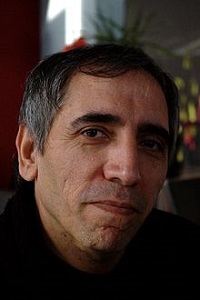
Mohsen Makhmalbāf (Teheran, 29 mei 1957)
De Oostenrijkse schrijver en theatercriticus Hans Weigel werd geboren op 29 mei 1908 in Wenen. Zie ook alle tags voor Hans Weigel op dit blog.
Uit: Unvollendete Symphonie
“Man saß viel beisammen in jenem dunklen und kalten Winter nach dem Krieg. Licht und Wärme schienen im Beisammensein vervielfacht. Es gab auch kaum andere Verbindungen zu den Menschen als: sie aufsuchen. So ging man, wenn man in der Nähe war, zu denen, die man kannte, in die Wohnung. Waren sie zu Hause, saßen wohl andere schon bei ihnen und holten sich Licht und Wärme. Das war eine unbekümmerte und sehr ursprüngliche Geselligkeit. Mir erschien sie damals als die wienerische Art der Geselligkeit; denn ich war erst im Herbst nach Wien gekommen. Was ich hier fand, kam mir nicht wie zu dieser Zeit, sondern wie zu dieser Stadt gehörend vor. Viel später erst merkte ich allmählich, wie die Zeit und die Stadt einander wandelten.
Wer ein Zimmer betritt und drin eine Anzahl von Menschen findet, meint, daß er eine Gesellschaft vor sich hat, und bringt sie in viel dichtere Beziehung zueinander, als es meist angemessen ist. So ging es mir, als ich in die große Stadt Wien, aus dem kleinen Bezirk meiner ersten Jugend kommend, kläglichen Einzug hielt. Die Zufälligkeiten erster Begegnungen schienen mir unwandelbare Gegebenheiten. Und so ist’s wohl auch dir gegangen, als du in dieses zufällige Zimmer gekommen bist, in dem inmitten von Zufälligkeiten zufällig auch ich gesessen bin.
Der Hausherr, einer meiner noch spärlichen Bekannten jener Tage, hatte eben auf einem großen Teller Brote aufgetischt, bestrichen mit einer Mischung, die uns erstaunlich wohlschmeckend vorkam, deren Hauptbestandteil für uns, auf ewig unvergeßbar, mit jenen Zeiten verbunden zu sein schien und von der ich heute kaum mehr weiß, daß sie »Nährhefe« hieß.
Es hat geläutet. Der Hausherr ging öffnen. Man hat jubelnde Schreie und Rufe einer stürmischen Begrüssung gehört. Dann ist er mit einem anderen Mann im Zimmer gestanden, noch ganz im Eindruck des Augenblicks und mit männlichem verhaltenem Ungeschick nach äußeren Mitteln zum Erweis von Liebe, Freude und Freundschaft suchend: Umarmen, Auf-die-Schulter-Klopfen, Händeschütteln.“
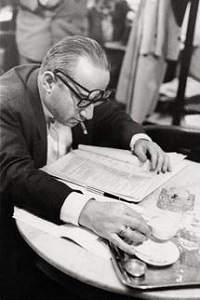
Hans Weigel (29 mei 1908 – 12 augustus 1991)
De Amerikaanse schrijver Max Brand (eig. Frederick Schiller Faust) werd geboren op 29 mei 1892 in Seattle. Zie ook alle tags voor Max Brand op dit blog.
Uit: Gunman's Reckoning
“The fifty empty freights danced and rolled and rattled on the rough road bed and filled Jericho Pass with thunder; the big engine was laboring and grunting at the grade, but five cars back the noise of the locomotive was lost. Yet there is a way to talk above the noise of a freight train just as there is a way to whistle into the teeth of a stiff wind. This freight-car talk is pitched just above the ordinary tone--it is an overtone of conversation, one might say--and it is distinctly nasal. The brakie could talk above the racket, and so, of course, could Lefty Joe. They sat about in the center of the train, on the forward end of one of the cars. No matter how the train lurched and staggered over that fearful road bed, these two swayed in their places as easily and as safely as birds on swinging perches. The brakie had touched Lefty Joe for two dollars; he had secured fifty cents; and since the vigor of Lefty's oaths had convinced him that this was all the money the tramp had, the two now sat elbow to elbow and killed the distance with their talk.
"It's like old times to have you here," said the brakie. "You used to play this line when you jumped from coast to coast."
"Sure," said Lefty Joe, and he scowled at the mountains on either side of the pass. The train was gathering speed, and the peaks lurched eastward in a confused, ragged procession. "And a durned hard ride it's been many a time."
"Kind of queer to see you," continued the brakie. "Heard you was rising in the world."
He caught the face of the other with a rapid side glance, but Lefty Joe was sufficiently concealed by the dark.
"Heard you were the main guy with a whole crowd behind you," went on the brakie.
"Yeh?"
"Sure. Heard you was riding the cushions, and all that."
"Yeh?"
"But I guess it was all bunk; here you are back again, anyway."
"Yep," agreed Lefty.
The brakie scratched his head, for the silence of the tramp convinced him that there had been, after all, a good deal of truth in the rumor.”

Max Brand (29 mei 1892 – 12 mei 1944)
Cover
De Franse schrijfster Anne Marie Louise d'Orléans, hertogin van Montpensier, werd geboren op 29 mei 1627 in Parijs. Zie ook alle tags voor Anne d'Orléans de Montpensier op dit blog.
Uit: Memoiresde Mademoisellede Montpensier
« Il se passa beaucoup de choses pendant ce temps-là : je n'étois qu'un enfant pour lors, je n'avois part à rien et ne pouvois rien remarquer. Tout ce dont je me souviens, c'est d'avoir vu la cérémonie des chevaliers de l'ordre qui furent faits à Fontainebleau, dans laquelle aussi on dégrada de l'ordre M. le duc d'Elbœuf et le marquis de la Vieuville. Je vis ôter et rompre les tableaux de leurs armes qui étoient au rang des autres ; j'en demandai la raison : l'on me dit que l'on leur faisoit cette injure parce qu'ils avoient suivi Monsieur. Je me mis aussitôt à pleurer, et je me sentis si touchée de ce traitement, que je voulus me retirer, et je dis que je ne pouvois voir cette action avec bienséance. Mon dépit ne me faisoit pourtant pas haïr la cour : j'étois ravie lorsqu'elle étoit à Fontainebleau et que Leurs Majestés m'envoyoient querir. Quand cela m'arrivoit, j'y étois trois ou quatre semaines dans la joie de mon cœur, par les divertissements continuels que j'y trouvois à mon goût. Il est vrai que le roi adoucissoit bien, par la tendresse qu'il me témoignoit, le déplaisir que me donnoit l'aversion qu'il avoit pour Monsieur. Les sentiments de la reine ne s'accordoient point aux siens en cela ; je pense que les amitiés qu'elle me faisoit n'étoient que des effets de celle qu'elle avoit pour Monsieur. Si les histoires de ce temps-là en font mention, celles d'aujourd'hui pourront bien dire le contraire. J'étois tellement accoutumée à leurs caresses, que j'appelois le roi mon petit papa, et la reine ma petite maman ; je croyois qu'elle l'étoit, parce que je n'avois jamais vu ma mère. Lorsque j'étois à Paris, tout ce qui'il y avoit de filles de qualité venoient me faire jouer ; et les plus assidues auprès de moi étoient mesdemoiselles de Longueville, d'Épernon, de Brissac, les filles de M. de Gramont, mesdemoiselles de Lannoi, du Lude, Séguier, fille du chancelier, de Rancé, de la Ville-aux-Clercs, Jarnac, et beaucoup d'autres ; et celles-là étoient mes particulières amies. »
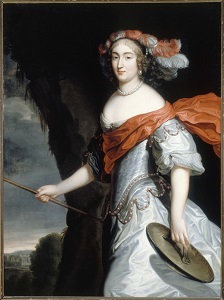
Anne d'Orléans de Montpensier (29 mei 1627 – 5 april 1693)
Uit het atelier van Charles et Henri Beaubrun, rond 1660
De Argentijnse dichteres Alfonsina Storni werd geboren in Sala Capriasca, Zwitserland op 29 mei 1892. Zie ook alle tags voor Alfonsina Storni op dit blog.
My Sister
It's ten o'clock at night; in the room in semidarkness
My sister is asleep, hands on her chest;
Her face is very white and very white her bed,
As if it understood, the light is almost unlit
She sinks into the bed like rosy fruit,
from smooth pastures into the depths of the mattress.
The air enters her chest and raises it chastely
With its rhythm measuring the fleeting minutes.
I tuck her tenderly into the white covers
And protect from the air her two divine hands;
Walking on tiptoe I close all the doors,
leave the shutters half-open and draw the drapes
There's a lot of noise outside, drowning so much noise
The men are suing each other, whisper the women,
Words of hate go up, the shouts of the merchants:
Oh, voices, stop it. Don't enter till you come to your nest.
My sister is weaving her silk cocoon
Like a skilled caterpillar: her cocoon is a dream.
With thread of gold she weaves the silken ball:
Spring is her life. I am already summer.
She counts with only fifteen Octobers in her eyes,
And so her eyes are so clean and clear;
She beleives that storks, from strange countries,
Come down carrying beautiful babies with little red feet.
Who wants to enter now? Oh, is it you, good wind?
Do you want to watch her? Come in. But first,
Warm up a moment; don't go so soon
and freeze the gentle dream in her present.
Like you, it's well that the rest would like to come in
and watch that whiteness, those immaculate cheeks,
Those fine bags under her eyes, those simple lines,
You would see them, wind, and kneel and weep.
Oh, if you love her, be good a day, because she
flees from the light if it hurts her. Watch your words,
and your intention. Her soul, like wax, can be carved,
But like wax, too much touch destroys her.
Do as that star that watches her by night,
Filtering its eye through a crystalline veil:
That star rubs its eyelashes and spins,
But does not wake her, silent in the sky.
Fly away, if it's possible, for your snow-white orchard:
Piety for your soul! She is immaculate.
Piety for your soul! I know it all, it's true.
But she is like the sky: She knows nothing.
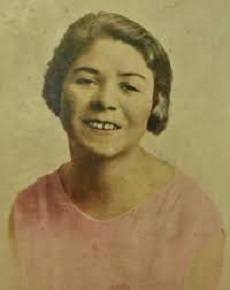
Alfonsina Storni (29 mei 1892 – 25 oktober 1938)
De Oostenrijkse dichter, schrijver en uitgever Till Mairhofer werd geboren op 29 mei 1958 in Steyr. Zie ook alle tags voor Till Mairhofer op dit blog.
des spinners lied
der abschied ist immer
der abschied für immer
das aus dem haus gehen
und nicht wiederkehren
so gehe ich
bevor ich gehe
den vorabend nachtlang
die bücherreihen lang
schlage auf schlage nach
immer ein spätwerk
von jedem möglichst das letzte.
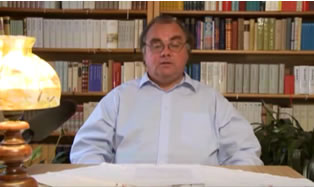
Till Mairhofer (Steyr, 29 mei 1958)
|



